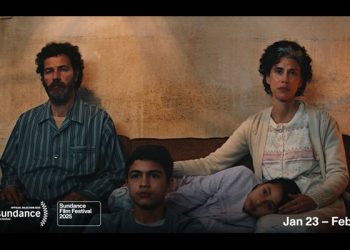The documentary takes viewers into the heart of BBC Persian’s newsroom in London as the team covers the unrest in Iran.
For the first time, the BBC has lifted the lid and gone behind the scenes with the BBC News Persian team, showing the work that goes into reporting Iran while the BBC is banned from the country, and the struggle and turmoil faced by staff.
Produced, directed and filmed by the BBC’s Namak Khoshnaw, Reporting Iran: Inside BBC Persian is available via BBC iPlayer and the BBC News YouTube channel from January 12. It will be broadcast by BBC News and BBC World News TV channels from Saturday, January 14.
The documentary takes viewers into the heart of BBC Persian’s newsroom in London as the team covers the unrest in Iran. BBC Persian presenters, reporters and producers talk about the complexities and challenges of carrying out their journalism despite being banned in Iran, and the personal sacrifices they make to do it.
Opening on the day of special reporting marking four weeks following the death of Mahsa Amini – the 22-year-old whose death in police custody has triggered national protest – the documentary shows the work of a presenter who is told while on air that Mahsa’s father is on the line. As she asks the grieving father about the official report just released, stating the cause of his daughter’s death, the line keeps breaking just as he tries to say what he thinks the truth is.
Showing the challenges of reporting despite all the attempts by the Iranian government to hide the truth, the documentary zeroes in on the work of the BBC Persian social-media team. BBC journalists can’t be sent to Iran, and in order to report and counter the disinformation, the team checks information to verify events, people, locations and meta-data.
Similar forensic work goes into the reporting of the disappearance and death of 16-year-old Nika Shakarami who was among the protesters. The verification process – from confirming the exact locations of the video clips, analysing the officially released video, to talking to eyewitnesses and Nika’s family, to checking the authenticity of the document stating the cause of death – takes the team a few days. One team member compares the work to puzzles they have to put together to build up an accurate picture of events.
In an emotive narrative of Reporting Iran: Inside BBC Persian, the reporting of the dramatic and tragic events unfolding in Iran is intertwined with the personal drama and sacrifice by the BBC journalists whose persecution and harassment by Iranian authorities has been the subject of multiple protests by the BBC and the UN.
The Iranian authorities are not the only source of harassment and abuse suffered by BBC journalists. The film portrays their treatment by some participants of an opposition rally in Berlin, who taunt and slam BBC Persian for giving a platform, in their view, to pro-government figures. It also talks about a presenter who is accused of sympathising with the Iranian security forces, and is subjected to trolling.
Reporting Iran: Inside BBC Persian is full of details that bring to the fore the personal dimension of the journalists who are reporting the country they come from. It closes “With thanks to the staff of BBC Persian, those who appeared in the film and those who chose not to. And with respect to all journalists harassed and intimidated for doing their jobs, in pursuit of the facts.”
BBC News Persian is part of BBC World Service.















































































